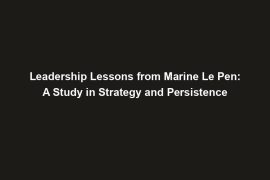Hey there, history buffs and aspiring leaders! Today, we are diving into the fascinating world of Hugh Capet, a powerful figure from the medieval era who left a lasting impact on history. If you’re not familiar with Hugh Capet, don’t worry – I’ve got you covered.
Hugh Capet was a medieval king of France who played a crucial role in shaping the course of history. His reign marked the beginning of the Capetian dynasty, which would go on to rule France for centuries. But why should we care about a leader from centuries ago, you might ask? Well, studying historical figures like Hugh Capet can actually provide us with some valuable insights for our own leadership journeys in the modern world.
In this blog post, we’ll be exploring the leadership lessons that we can learn from Hugh Capet’s time as king. From fostering loyalty and building strong relationships with allies, to defying traditional norms and adapting to change, there’s a lot we can take away from his reign. So, buckle up and get ready to uncover some key leadership lessons that will help you become a better leader in your own right. Let’s get started!
Fostering Loyalty and Building Strong Relationships with Allies
When it comes to leadership, one of the key lessons we can learn from Hugh Capet is the importance of fostering loyalty and building strong relationships with allies. Hugh Capet strategically formed alliances with various nobles and religious leaders to strengthen his rule and maintain stability within his realm. By building trust and loyalty among his allies, Capet was able to secure their support and create a network of individuals who were invested in his success.
Building relationships based on trust and loyalty is essential for any leader, whether in a historical context or in the modern world. Just like Hugh Capet, leaders today must cultivate strong connections with their colleagues, partners, and team members to create a solid foundation for their leadership. Loyalty and trust are the cornerstones of effective leadership, allowing a leader to inspire confidence and unity among their followers.
Defying Traditional Norms and Adapting to Change
Hugh Capet’s rise to power was marked by his defiance of traditional power structures and his ability to adapt to changing circumstances. He challenged the established norms of his time to establish his dynasty and assert his authority over his kingdom. This willingness to break with tradition and adapt to new challenges is a valuable lesson for modern leaders.
In today’s rapidly changing world, leaders must be flexible and adaptable in order to navigate uncertainty and overcome obstacles. Like Hugh Capet, leaders need to be willing to challenge the status quo, embrace change, and evolve their strategies to meet the demands of the present moment. By embracing flexibility and adaptability, leaders can better position themselves for success and create a more resilient and dynamic organization.
Establishing a Legacy through Long-Term Vision and Strategic Planning
One of the most enduring legacies of Hugh Capet is his long-term vision for his dynasty and his strategic planning to achieve it. Capet had a clear vision of the future he wanted to create for his kingdom, and he meticulously planned and executed his strategies to bring that vision to life. This emphasis on long-term planning and strategic foresight allowed Capet to establish a lasting legacy that would endure for centuries to come.
For modern leaders, the importance of strategic planning and long-term vision cannot be overstated. By looking beyond the immediate challenges and opportunities, leaders can create a roadmap for success that will guide their actions and decisions in the long run. Just as Hugh Capet’s visionary leadership shaped the course of history, modern leaders can use strategic planning to build a sustainable and impactful legacy for their organizations.
Conclusion
After diving into the leadership lessons of Hugh Capet, it’s clear that there is much to be gained from studying historical figures like him. By looking back at how Capet fostered loyalty, defied norms, and established a lasting legacy, we can gain valuable insights into effective leadership practices that are as relevant today as they were centuries ago.
Summary of Key Lessons
One of the key takeaways from Capet’s example is the importance of building strong relationships with allies. Whether it’s in the boardroom or on the battlefield, trust and loyalty are essential for any leader looking to secure their position and achieve their goals.
Moreover, Capet’s ability to adapt to changing circumstances and challenge traditional norms teaches us the value of flexibility and innovation in leadership. In a fast-paced world where disruption is the norm, being able to think outside the box and embrace change is crucial for success.
Finally, Capet’s long-term vision and strategic planning show us the power of thinking ahead and laying the groundwork for a lasting impact. By setting clear goals and carefully plotting a course of action, leaders can create a legacy that extends far beyond their time in power.
Relevance for Modern Leaders
In today’s complex and rapidly changing world, the lessons of Hugh Capet are more relevant than ever. By applying his principles of loyalty, adaptability, and strategic planning, modern leaders can navigate the challenges of their own time with confidence and resilience.
Call to Action
So, dear readers, I urge you to take these lessons to heart and apply them in your own leadership roles. Whether you’re a CEO, a team leader, or a community organizer, the wisdom of Hugh Capet can help guide you on your path to success. Let’s continue to learn from history and strive to be the best leaders we can be. The legacy of Capet lives on – let’s make sure ours does too.



